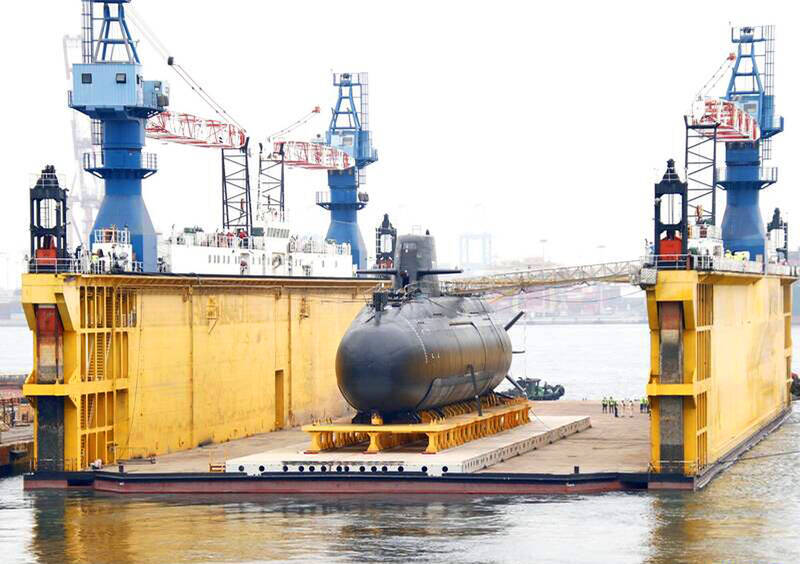The Hai Kun submarine has completed 50 percent to 60 percent of Harbor Acceptance Test requirements, the navy told a news conference at the Ministry of National Defense yesterday in a rebuttal of allegations that the boat failed to meet 70 trial metrics.
Chief of Staff Vice Admiral Chiu Chun-jung’s (邱俊榮) remark came a day after Taiwan Television News reported that the boat failed to meet 70 of the trial’s technical requirements.
The indigenously developed and built Hai Kun — the lead boat of its class — is expected to be the first of seven new attack submarines.

Photo: Hung Ting-hung, Taipei Times
Media reports on the submarine’s failure to meet the trial’s metrics are mostly false, since the Harbor Acceptance Test discovered only about a dozen shortcomings, Chiu said, adding that many of the trial’s tests involve interrelated capabilities.
The navy anticipates completing the submarine’s Sea Acceptance Test in December and receiving delivery of it in November next year, he said.
The Sea Acceptance Test would involve trials in surfaced navigation, submerged navigation, diving and other key performance categories, he added.
This pace of progress is deemed acceptable and delays have been within the expected margins, Chiu said.
The submarines would be built in three batches of two, three and two for a total of seven boats, instead of the previously planned batches of three, two and two, he said.
This change was made to allow more flexibility in the construction of follow-up vessels, give the manufacturing and design team room to absorb the lessons learned and decrease the costs per boat, he added.

CHAOS: Iranians took to the streets playing celebratory music after reports of Khamenei’s death on Saturday, while mourners also gathered in Tehran yesterday Iranian Supreme Leader Ayatollah Ali Khamenei was killed in a major attack on Iran launched by Israel and the US, throwing the future of the Islamic republic into doubt and raising the risk of regional instability. Iranian state television and the state-run IRNA news agency announced the 86-year-old’s death early yesterday. US President Donald Trump said it gave Iranians their “greatest chance” to “take back” their country. The announcements came after a joint US and Israeli aerial bombardment that targeted Iranian military and governmental sites. Trump said the “heavy and pinpoint bombing” would continue through the week or as long

TRUST: The KMT said it respected the US’ timing and considerations, and hoped it would continue to honor its commitments to helping Taiwan bolster its defenses and deterrence US President Donald Trump is delaying a multibillion-dollar arms sale to Taiwan to ensure his visit to Beijing is successful, a New York Times report said. The weapons sales package has stalled in the US Department of State, the report said, citing US officials it did not identify. The White House has told agencies not to push forward ahead of Trump’s meeting with Chinese President Xi Jinping (習近平), it said. The two last month held a phone call to discuss trade and geopolitical flashpoints ahead of the summit. Xi raised the Taiwan issue and urged the US to handle arms sales to

BIG SPENDERS: Foreign investors bought the most Taiwan equities since 2005, signaling confidence that an AI boom would continue to benefit chipmakers Taiwan Semiconductor Manufacturing Co’s (TSMC, 台積電) market capitalization swelled to US$2 trillion for the first time following a 4.25 percent rally in its American depositary receipts (ADR) overnight, putting the world’s biggest contract chipmaker sixth on the list of the world’s biggest companies by market capitalization, just behind Amazon.com Inc. The site CompaniesMarketcap.com ranked TSMC ahead of Saudi Aramco and Meta Platforms Inc. The Taiwanese company’s ADRs on Tuesday surged to US$385.75 on the New York Stock Exchange, as strong demand for artificial intelligence (AI) applications led to chip supply constraints and boost revenue growth to record-breaking levels. Each TSMC ADR represents

State-run CPC Corp, Taiwan (CPC, 台灣中油) yesterday said that it had confirmed on Saturday night with its liquefied natural gas (LNG) and crude oil suppliers that shipments are proceeding as scheduled and that domestic supplies remain unaffected. The CPC yesterday announced the gasoline and diesel prices will rise by NT$0.2 and NT$0.4 per liter, respectively, starting Monday, citing Middle East tensions and blizzards in the eastern United States. CPC also iterated it has been reducing the proportion of crude oil imports from the Middle East and diversifying its supply sources in the past few years in response to geopolitical risks, expanding